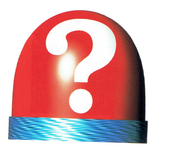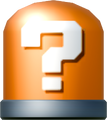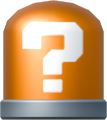? Switch
- This article is about the object that appears in various games. For the level with the same name in Super Mario 64 DS, see Tower of the Wing Cap.
| ? Switch | |
|---|---|
 A red ? Switch from Yoshi's Story | |
| First appearance | Yoshi's Story (1997) |
| Latest appearance | Super Mario Bros. Wonder (2023) |
| Effect | Causes a mysterious event |
A ? Switch, also known as a Mystery Switch,[1][2] a Question Mark Switch,[3] a ? Switch Block,[4] or erroneously a ? Block,[5] is a Switch Block that has widely varying effects depending on the context.
History[edit]
Yoshi's Story[edit]
In Yoshi's Story, when a Yoshi presses a ? Switch by simply jumping on it, the ? Switch disappears and a part of the level is changed briefly. As the effect expires, the switch's music speeds up. There are panels that also act as a ? Switch and extend the switch's time limit.
Super Mario series[edit]
Super Mario 64 DS[edit]
- Main article: Cap Switch
In Super Mario 64 DS, the red, green, and blue ! Switches from Super Mario 64 were reduced to a red ? Switch. It appears in a secret course named after it (also titled Tower of the Wing Cap), and it activates corresponding ? Blocks.
New Super Mario Bros.[edit]
? Switches later appear in New Super Mario Bros., this time with an orange color. Like the ones in Yoshi's Story, these switches change or add to an area of a level, like adding moving platforms or flipping the entire level upside down. The effects of a ? Switch can be either temporary or permanent, depending on the ? Switch. One appears in the fight against Mega Goomba, being the only time one is used against a boss. Most levels have only one ? Switch, but some have two of them.
? Switches appear in the following levels, with the following functions:
- World 2-3: Raises the water level
- World 2-4: Causes certain sand hills to form
- World 2-
 Castle: Causes certain sand trenches to form
Castle: Causes certain sand trenches to form - World 3-3: Disables currents
- World 3-
 Ghost House: Causes staircases to form over slopes, and causing certain Warp Doors to appear
Ghost House: Causes staircases to form over slopes, and causing certain Warp Doors to appear - World 4-3: Disables currents
- World 4-
 Ghost House: Causes ? Blocks on strings to drop down
Ghost House: Causes ? Blocks on strings to drop down - World 4-
 Castle: Causes elevating platforms to appear to allow Mario to reach Mega Goomba
Castle: Causes elevating platforms to appear to allow Mario to reach Mega Goomba - World 5-C: Causes some Red Blocks to appear, one column after another
- World 7-
 Ghost House
Ghost House
- Causes certain Warp Doors to appear
- Causes certain lifts to appear
- World 8-2: Raises the water level
- World 8-
 Bowser's Castle
Bowser's Castle
- Tilts certain parts of the level upside down
- Causes a certain lift to appear
New Super Mario Bros. Wii[edit]
In New Super Mario Bros. Wii, ? Switches reappear with their design from New Super Mario Bros., though they are less common than before. World 6-6 notably features multiple with separate functions.
? Switches appear in the following levels, with the following functions:
- World 2-2: Causes certain lifts to appear
- World 5-
 Ghost House: Causes all of the Light Blocks to light up
Ghost House: Causes all of the Light Blocks to light up - World 6-3: Raises the water level
- World 6-6
- Activates the tilt-controlled lights for the raft
- Causes certain lifts to appear
- World 7-
 Ghost House: Causes certain lifts to appear
Ghost House: Causes certain lifts to appear - World 8-4: Destroys certain Hard Blocks
- World 9-5: Causes certain lifts to appear
New Super Mario Bros. 2[edit]
In New Super Mario Bros. 2, ? Switches have become more common. Several are used for spawning more coins. They additionally appear in some of the DLC courses.
? Switches appear in the following levels, with the following functions:
- World 3-1: Causes a nearby Warp Pipe to shower coins
- World 3-4: Causes a nearby Warp Pipe to shower coins
- World 3-A: Disables currents
- World 4-5: Disables currents
- World 5-
 Ghost House: Causes certain Warp Doors to appear
Ghost House: Causes certain Warp Doors to appear - World 6-1: Causes certain Hard Blocks to appear, one large area after another
- World 6-
 Ghost House: Causes certain walls to retract
Ghost House: Causes certain walls to retract - World 6-2: Destroys certain Hard Blocks
- World
 Mushroom-
Mushroom- Ghost House: Causes certain blue blocks to appear and disappear
Ghost House: Causes certain blue blocks to appear and disappear - World
 Mushroom-3: Causes two nearby Warp Pipes to shower coins
Mushroom-3: Causes two nearby Warp Pipes to shower coins - World
 Mushroom-A: Destroys certain unbreakable blocks
Mushroom-A: Destroys certain unbreakable blocks - World
 Flower-B: Causes certain Roulette Coin Blocks to appear
Flower-B: Causes certain Roulette Coin Blocks to appear - World
 Star-1: Changes the alignment of certain Brick Block structures
Star-1: Changes the alignment of certain Brick Block structures - First Course (Gold Mushroom Pack): Causes an area directly above the player to shower Gold Mushrooms
- First Course (Coin Challenge Pack B): Causes certain blue blocks to appear and disappear
- Second Course (Coin Challenge Pack C): Destroys certain Hard Blocks
- First Course (Platform Panic Pack): Causes an area directly above the player to shower coins
- Third Course (Mystery Adventures Pack): Changes the alignment of certain Brick Block structures
New Super Mario Bros. U / New Super Luigi U / New Super Mario Bros. U Deluxe[edit]
In New Super Mario Bros. U, ? Switches are again less common. Some act somewhat similar to ! Switches in New Super Mario Bros. and New Super Mario Bros. 2 by causing red blocks to appear. In New Super Luigi U, ? Switches are considerably uncommon, appearing in only three levels. In New Super Mario Bros. U Deluxe, ? Switches return in both capacities.
? Switches appear in the following New Super Mario Bros. U levels, with the following functions:
- Stone-Eye Zone: Causes an area directly above the player to shower coins
- Tropical Refresher: Causes an area directly above the player to shower coins, including the second Star Coin at the end
- Light Blocks, Dark Tower: Causes all of the Light Blocks to light up
- Thrilling Spine Coaster: Causes some red blocks to appear
- Roy's Conveyor Castle: Destroys certain Hard Blocks
- Pendulum Castle: Causes some red blocks to appear
- World
 Coin-7: Causes certain red blocks to disappear
Coin-7: Causes certain red blocks to disappear
? Switches appear in the following New Super Luigi U levels, with the following functions:
- Dancing Blocks, Poison Swamp: Causes certain Brick Blocks to move into place
- Switch-Lift Express: Causes certain solid platforms to move from one position to another
- Roy's Ironclad Castle: Destroys certain Hard Blocks
Super Mario Maker[edit]
In versions of Super Mario Maker before version 1.30, P Switches in the New Super Mario Bros. U game style have the appearance of ? Switches.
Super Mario Bros. Wonder[edit]
In Super Mario Bros. Wonder, ? Switches are about as uncommon as in New Super Luigi U, as they only appear in two Break Time! levels and one main level.
? Switches and their purpose in the levels are as follows:
- Break Time! Zip-Go-Round: Turns certain ground blocks into Zip Tracks and spawning coins, flower coins, and Wonder Tokens
- Break Time! Tumble House: Causes the entire level to periodically rotate ninety degrees counterclockwise and spawning coins, flower coins, and Wonder Tokens
- Deep Magma Bog Flying Battleship: Turns certain yellow blocks into Dotted-Line Blocks
Profiles and statistics[edit]
Yoshi's Story[edit]
- Instruction booklet description:
- Message Block information for the ? Switch (set to French): Marchez dessus et quelque chose de nouveau apparaîtra![7] (Step on it and something new will appear!)
Gallery[edit]
Names in other languages[edit]
| Language | Name | Meaning | Notes |
|---|---|---|---|
| Japanese | ?スイッチ[?] ? Suitchi |
? Switch | Yoshi's Story |
| ハテナスイッチ[8] Hatena Suitchi |
|||
| スイッチブロック[9] Suitchi Burokku |
Switch Block | New Super Mario Bros., shared with P Switch and ! Switch | |
| Chinese (simplified) | ?开关[10] ? Kāiguān |
? Switch | |
| French | Interrupteur ?[11] | ? Switch | |
| Interrupteur[6] | Switch | ||
| Interrupteur "?"[7] | "?" Switch | ||
| German | ?-Schalter[12] | ? Switch | |
| Italian | Interruttore[13] | Switch | Yoshi's Story |
| Blocco interruttore ?[14][15] | ? Switch Block | New Super Mario Bros. series | |
| Interruttore ?[16] | ? Switch | Super Mario 64 DS | |
| Interruttore "?"[17] | "?" Switch | Super Mario Bros. Encyclopedia | |
| Portuguese (NOE) | Bloco de Mudança ?[?] | ? Change Block | New Super Mario Bros. |
Trivia[edit]
- Although New Super Mario Bros. does have ? Switches in-game, the red ? Switch model from Super Mario 64 DS was left unused in the files of the final version. However, it was used in early prototypes.
References[edit]
- ^ Leung, Jason et al (1998). Yoshi's Story Player's Guide. Nintendo Power (American English). Page 16.
- ^ Nintendo (1998). Yoshi's Story official website. Archived December 2, 1998, 10:41:37 UTC from the original via Wayback Machine. Retrieved April 14, 2020.
- ^ Prima Bath (April 7, 1999). Nintendo 64 Game Secrets, 1999 Edition Prima's Official Strategy Guide. Prima Games (American English). ISBN 0-7615-2103-8. Page 104, 111.
- ^ 2006. New Super Mario Bros. instruction booklet. Nintendo of UK (British English). Page 18.
- ^ a b 1998. Yoshi's Story instruction booklet. Nintendo of Australia (Australian English). Page 15.
- ^ a b 1998. Yoshi Story instruction booklet, French segment. Nintendo (French). Page 59.
- ^ a b Yoshi's Story in-game name (French localization)
- ^ October 19, 2015. Super Mario Bros. Hyakka: Nintendo Kōshiki Guidebook, Super Mario Sunshine section. Shogakukan (Japanese). ISBN 978-4-09-106569-8. Page 119, 151, 200, 216.
- ^ 2006.
New スーパーマリオブラザーズ (Nyū Sūpā Mario Burazāzu) manual. Nintendo (Japanese). Page 17. - ^ New 超级马力欧兄弟. iQue (Simplified Chinese). Retrieved February 8, 2024.
- ^ 2005. Super Mario 64 DS instruction booklet. Nintendo of Europe (French). Page 68.
- ^ 2006. New Super Mario Bros. instruction booklet. Nintendo of Europe (German). Page 20.
- ^ 1998. Yoshi's Story European manual. Nintendo of Europe (British English). Page 123.
- ^ 2006. New Super Mario Bros. European manual. Nintendo of Europe (Italian). Page 88.
- ^ 2009. New Super Mario Bros. Wii Italian manual. Nintendo of Europe (Italian). Page 25.
- ^ 2005. Super Mario 64 DS manual. Nintendo of Europe (Italian). Page 106.
- ^ November 15, 2018. Super Mario Bros. Enciclopedia. Magazzini Salani (Italian). ISBN 889367436X. Page 119, 151, 200, 216.



